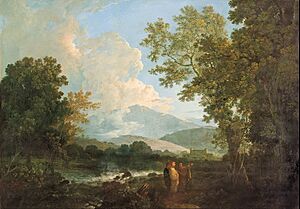Titus Pomponius Atticus facts for kids
Quick facts for kids
Titus Pomponius Atticus
|
|
|---|---|
| Born |
Titus Pomponius
|
| Other names | Quintus Caecilius Pomponianus Atticus |
| Spouse(s) | Pilia |
| Children | Attica |
| Parents |
|
Titus Pomponius Atticus (born November 110 BC – died March 32 BC) was a very important Roman. He was known as an editor, a banker, and a supporter of writers. He later changed his name to Quintus Caecilius Pomponianus Atticus.
Atticus is most famous for being a close friend of Marcus Tullius Cicero. Cicero was a well-known Roman statesman. Atticus came from a rich Roman family. They belonged to the equestrian class. This was a wealthy group, but they were not part of the ruling noble families.
Cicero and Atticus were friends since they were kids. Cicero even wrote a book called Laelius on Friendship and dedicated it to Atticus. They wrote many letters to each other. These letters often used a secret code to hide their thoughts about politics. Cicero's secretary, Tiro, collected these letters. They are now known as Letters to Atticus.
Contents
Atticus's Life Story
His Early Years in Rome
Titus Pomponius was born in Rome around November 110 BC. His parents were Titus Pomponius, a rich businessman, and Caecilia. His family belonged to the equestrian class. This meant they were respected and wealthy. He also had a sister named Pomponia.
Atticus's father made sure he got a good education. Some of his school friends became important leaders. These friends included Cicero, who became a consul in 63 BC. Atticus was a very good student. His education prepared him for a life in Roman public service.
Moving to Athens
Around 86 BC, Atticus left Rome. He probably wanted to avoid the civil wars happening there. He moved most of his money to Athens, a city in Greece. He stayed in Athens for about 20 years, until 65 BC.
Atticus loved Athens very much. He even gave himself the nickname "Atticus." This means "Man of Attica," which is the region around Athens. While he was in Athens, Julius Caesar was once his guest.
Atticus's Work and Wealth

Atticus inherited money from his family. He was very good at investing it, especially in land. This made him even richer. He used his wealth to support his love for books and writing.
He trained his Roman slaves to be scribes. Scribes were people who copied books by hand. They also learned to make papyrus scrolls. This allowed Atticus to publish books, including those written by his friend Cicero. His copies of Greek writers like Plato were known for being very accurate.
Atticus also wrote some books himself. He wrote about Cicero's time as consul. He also wrote a book about Roman history and some Roman poetry. Sadly, none of his own writings have survived.
His Return to Rome
Atticus returned to Rome in 65 BC. He tried to stay out of politics as much as possible. However, he often helped Cicero when his friend was in trouble. For example, when Cicero had to leave Rome in 49 BC, Atticus gave him a large sum of money.
Atticus generally held traditional views. He was also friends with Marcus Licinius Crassus. Crassus was a powerful Roman leader.
Later, Atticus's rich uncle, Quintus Caecilius, died. Atticus became his adopted son and inherited his wealth. He then took the name Quintus Caecilius Pomponianus Atticus.
Atticus was friendly with the group who killed Julius Caesar. But he was not harmed after they lost the war. He even took care of Servilia, the mother of Brutus, after Brutus died in battle.
Family Life
In his later years, Atticus married a relative named Pilia. She was born around 75 BC and died in 46 BC. They got married between 58 and 56 BC, when Atticus was already in his early fifties. They had a happy marriage for 12 years.
They had one daughter, Attica. She later married Marcus Vipsanius Agrippa, a famous Roman general.
His Final Days
Atticus lived the rest of his life in Rome. Just after his 77th birthday, he became sick. At first, it seemed like a small illness. But after three months, his health got much worse.
He decided to end his life by not eating any food. He died on the fifth day of his fast. This was on March 31, 32 BC. He was buried in his family tomb. It was located about five miles outside Rome on the Appian Way.
See also
- Quintus Caecilius Epirota
 | Charles R. Drew |
 | Benjamin Banneker |
 | Jane C. Wright |
 | Roger Arliner Young |

